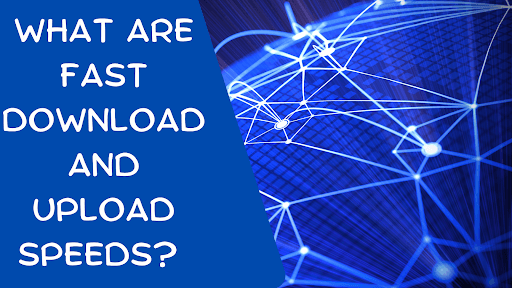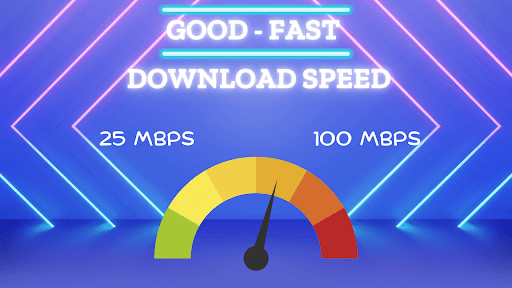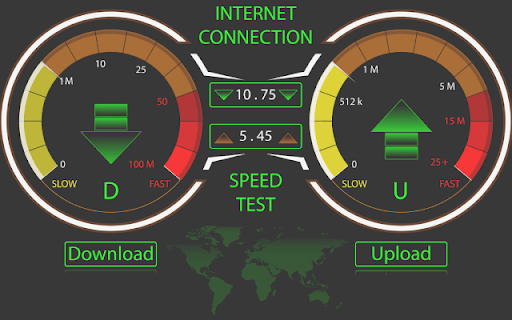What are fast download and upload speeds for home internet?
What fast download and upload speeds are?
All we know is that download and upload speed is critical,
Especially if you're constantly accessing the web for business, online shopping, video streaming, and other purposes, fast speeds will bring wonderful virtual moments.
For these things to operate effectively, you'll need to know what is called a fast speed.
Let’s find out in this post!

Fast download and upload speeds
What is a fast download speed?
Many people are always confused about 2 questions:
What is a good download speed? and what is a fast download speed?
In a simple way, a good download speed has a speed of at least 25 Mbps.
Most online activities such as web surfing, HD streaming, online gaming, and music downloads will be supported at these speeds.
Internet download speeds of 100 Mbps or higher are often considered fast.
This speed allows users to handle multiple online activities for multiple users at once without major interruptions in service.

Good - fast download speed
The greatest options for fast download speeds are cable internet.
Fiber-optic internet is also a good choice for speed consistency because it is less prone to slower speeds during peak usage times than cable.
See more: What is a good connection speed download for PS4?
What is a fast upload speed?
For HD video calling, Skype, for example, recommends upload speeds of 1.2 Mbps or greater.
With a 10 Mbps upload connection, uploading a huge file, such as a 700MB document, should take less than 10 minutes.
Those are recommended internet speeds for a single user in an ideal condition.
If you want a smooth online experience, you will need higher.
Upload speeds of 10 Mbps or greater are generally considered fast internet upload speeds since they can easily accommodate the typical user's activities.

Upload speeds of 10 Mbps or greater are generally considered fast
When registering an internet package, though, you usually don't have to consider upload speed.
Asymmetric DSL (ADSL) typically provides upload rates of up to 1.5 Mbps, whereas cable internet upload speeds range from 5 to 50 Mbps.
Even 1.5 Mbps ADSL is quite sufficient for most online basic activities.
When using video chat, uploading high-resolution pictures, or live streaming video from your home, upload speed becomes considerably more crucial.
If you frequently use your home network for business, school, or streaming, ADSL's slow upload speed will be a major issue.
Consider choosing a fiber or cable connection to get faster uploading speed.
What is the best download and upload speeds?
There is no specific number for the best download and upload speed.
They are determined by how you use the internet on a daily basis.
In fact, it is very rare that download speed is slower than upload speed.
Most Internet providers offer download speed faster upload speeds because the majority of internet activities require downloading.

How much is the best download and upload speed
Internet download speed slower than upload that can be due to wrong testing results or downloading throttling.
Generally, a good internet speed means a download speed of above 25Mbps and an upload speed of above 3 Mbps on average ( according to FCC).
This is based on a small family or workplace connecting to the internet with a few people.
If you still feel confused about “how much Mbps do you need?”, take a look at this table.
|
Internet speed (Mbps) |
Numbers of users |
Online activity |
|
5-20 |
1-2 |
|
|
20-40 |
1-3 |
|
|
40-100 |
2-4 |
|
|
100-500 |
2-5 |
|
|
500-1000 |
5 or more |
|
Which type of connection is best for you?
Aside from selecting sufficient internet speed for your internet demand, you also consider the type of connection when choosing a suitable internet plan.
Providers supply varying speeds at different pricing points, but these speeds are also restricted by the internet connection type they use.
For example, if you frequently produce YouTube videos and want to improve your internet so you don't have to wait so long while uploading them, you won't be able to significantly reduce your wait times with your present provider if they only provide DSL.
On the other hand, even the smallest fiber plans have faster upload speeds than DSL, so switching may even save you money on your monthly payment.
To sum up,
Using different connection types will bring different line speeds.
Here are 5 types of connection with advertised downloads and uploads.
Take references before opting for a suitable internet plan.
|
Connection type |
Advertised download speeds |
Advertised upload speeds |
|
DSL |
3–115 Mbps |
1–20 Mbps |
|
Cable |
25–1000 Mbps |
1–50 Mbps |
|
Fixed wireless |
25–300 Mbps |
1–50 Mbps |
|
Fiber |
30–5000 Mbps |
30–5000 Mbps |
|
Satellite |
12–200 Mbps |
3 Mbps |
Bottom line: Pay what you use
Fast internet is fantastic, but paying for a faster connection than you can use will not improve your online experience. To prevent paying for bandwidth that you will not use, choose an internet provider that fulfills your maximum speed needs. Hope the article of “what are fast download and upload speeds?” help you to have a good choice.
![Why is my download speed so SLOW but upload FAST: 3+ causes [Updated]](https://gospeedcheck.com/filemanager/data-images/Why-is-my-download-speed-so-slow-but-upload-fast_1.jpg)
![Why is my Xbox download speed so slow? 5 little-known reasons [SOLVED]](https://gospeedcheck.com/filemanager/data-images/Why-is-my-Xbox-download-speed-so-slow_1.jpg)



4 Comments
Benjamin Hall
Why do schools and libraries have extremely fast internet speed?
Leave a Comment
Your email address will not be published. Required fields are marked *MySpeed
If you are connected to university networks, you are often connected to high capacity switches without throttling or metering systems and with low contention ratios ensuring that the user experience is very good. The networks are often built and maintained by highly competent staff who are focused on ensuring a good user experience
Leave a Comment
Your email address will not be published. Required fields are marked *Caleb Hammond
Why is my download speed doesn't go more than 1mbps? The day when I started using wifi the speed was 6+ mbps. But now it's limited to 1 mbps. How can I get more than my ISP limited me?
Leave a Comment
Your email address will not be published. Required fields are marked *MySpeed
If your ISP is limiting you, there is nothing you can do to speed up the connection. But since you are using WiFi for access, it is far more likely you are using the same channel as someone else, and you are interfering with one another.
Leave a Comment
Your email address will not be published. Required fields are marked *Leave a Comment
Your email address will not be published. Required fields are marked *